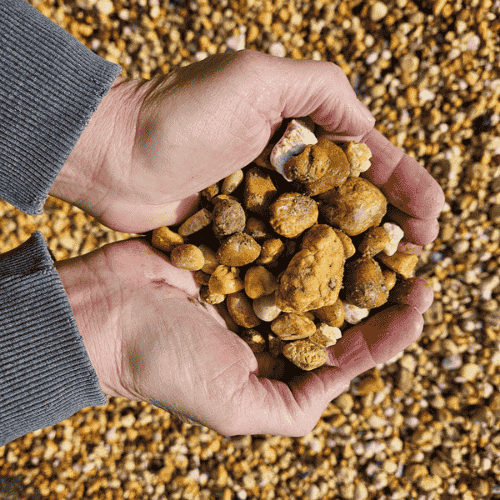
When it comes to landscaping in New Jersey, choosing the right material can make all the difference in both appearance and long-term maintenance. Two of the most popular choices for homeowners and contractors alike are river rock and crushed stone — but each serves a unique purpose and has its own set of advantages.
If you’re deciding between these two landscape staples, this guide will help you weigh the pros and cons so you can confidently choose the right fit for your yard, driveway, or garden bed.
What is River Rock?
River rock is a type of naturally smoothed stone, typically rounded by water erosion over time. It comes in various colors — from warm earth tones like browns and tans to cool grays and off-whites — and a range of sizes from ⅜-inch pebbles to large decorative stones.
Because river rock is tumbled naturally, it has a polished, smooth finish that gives any landscape a soft, calming look.
What is Crushed Stone?
Crushed stone, on the other hand, is a man-made aggregate created by breaking down rocks like granite, limestone, or dolomite. It has a jagged, angular texture and is often used as a base layer for construction or hardscape projects, like driveways, paths, and drainage systems.
It comes in multiple sizes as well, from fine dust (stone screenings) to coarse varieties like ¾-inch gravel.
Appearance: Which One Looks Better?
This is subjective, but here’s what to consider:
- River Rock offers a more natural and polished look. It’s commonly used for decorative borders, garden beds, water features, and around patios. Its varied color palette and rounded shape make it visually appealing.
- Crushed Stone gives a more rugged, utilitarian vibe. It’s commonly used where function is more important than form, such as in drainage ditches, under pavers, or as a driveway base.
🟢 Winner for appearance: River rock if you’re aiming for aesthetic landscaping.
Functionality and Use Cases
- Crushed Stone is excellent for structural purposes. Its angular edges allow it to compact tightly, making it ideal for supporting patios, pavers, retaining walls, or driveways.
- River Rock does not compact well because of its smooth surface. It’s better used in non-load-bearing areas like flower beds or as mulch alternatives.
🟢 Winner for structural performance: Crushed stone.
Drainage Capabilities
Both materials offer excellent drainage, but their performance varies depending on the project.
- Crushed Stone creates small air gaps that promote quick drainage. It’s often used in French drains, septic systems, and under concrete slabs.
- River Rock also allows water to pass through easily, but since it doesn’t compact, it may shift over time.
🟢 Winner for controlled drainage systems: Crushed stone.
Maintenance Requirements
- River Rock requires occasional raking to keep it in place and weed control to keep plant growth in check. It’s durable and doesn’t break down but may shift around in high-traffic areas.
- Crushed Stone stays put longer due to its angular edges, especially when installed over a proper base and with landscape fabric underneath. However, fine dust or debris may accumulate over time and cause weed growth if not maintained.
🟢 Winner for low maintenance: Crushed stone for paths, river rock for beds.
Cost Comparison
Let’s talk about budget — a major factor for many property owners.
- Crushed Stone tends to be more affordable, especially in bulk. In New Jersey, you can expect to pay anywhere from $35 to $50 per cubic yard, depending on the size and type of stone.
- River Rock is more expensive due to its aesthetic appeal and sourcing process. Prices usually range between $80 to $130 per cubic yard.
🟢 Winner for budget-conscious projects: Crushed stone.
Comfort Underfoot
If you’re planning to use the material for walkways or play areas, comfort is important.
- River Rock is smooth and rounded, making it more comfortable to walk on — especially for children or pets.
- Crushed Stone can be jagged and sharp, which may not be ideal for bare feet.
🟢 Winner for comfort: River rock.
Environmental Considerations
Both materials are long-lasting and don’t break down like organic mulch, making them sustainable in the long run.
However:
- River Rock can displace easier with rain or slope.
- Crushed Stone is easier to stabilize and less prone to shifting.
You can enhance sustainability by installing landscape fabric underneath either material to reduce weed growth and erosion.
Summary: Pros and Cons Chart
| Feature | River Rock | Crushed Stone |
|---|---|---|
| Appearance | Natural, polished | Rough, utilitarian |
| Structural Support | ❌ | ✅ |
| Drainage | ✅ | ✅ |
| Cost | Higher | Lower |
| Maintenance | Medium | Low |
| Comfort | ✅ | ❌ |
| Weed Control | Requires barrier | Easier with compaction |
Which Should You Choose?
Choose River Rock if:
- You want to elevate the look of your landscape beds or create a decorative border.
- You value aesthetics and a softer, polished appearance.
- You don’t need it to support heavy structures.
Choose Crushed Stone if:
- You need a stable base for a driveway, patio, or walkway.
- Drainage and long-term durability are your top concerns.
- You’re working on a budget.
Need Help Deciding?
At Kirk Allen Landscape Supply, we’ve been helping New Jersey homeowners, landscapers, and contractors choose the right materials for over a decade. Whether you’re looking to refresh your garden beds or build a new gravel path, we offer both river rock and crushed stone in a variety of sizes and colors — always in stock and available for pickup or delivery.
📍 Visit Us: https://www.kirkallenlandscapesupply.com/
📞 Call Now: 973-347-3117
Let our experienced team help you get the job done right, from backyard upgrades to large-scale landscaping projects.

